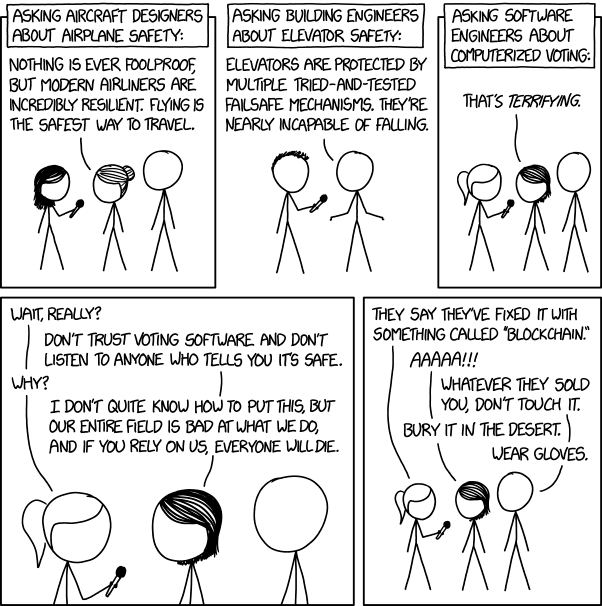
We have been getting warned since before the last election about the dangers of having no paper records for an election. The only reason that I am glad that Iowa happened is that it happened early enough for the various states to ensure that there is a physical voting trail, even if electronic machines are used.
The county I am in uses a paper ballot in which you fill in dots. That is fed into an electronic counter which submits its results using electronic connections. However, the paper ballots are always available in case of later questions. Frankly, I have never known them to be actually physically counted in recent history. However, the fact they are there is a source of stability about our votes.
Not surprisingly, some conservative media and blogs are already claiming that this is proof that national healthcare will not work or that giving more “power” to the government will not work. This argument conveniently ignores that the Iowa caucus is a privately-run public vote. While the caucus runs under Iowa law, it is not a public, but a private function run by a particular group of individuals.
There are currently multiple examples of the failure of computer systems in both public and private settings to run correctly. Anyone who has had to run an emergency patch on a system will confirm that information systems fail. There are also current multiple examples of the deliberate penetration of both public and private systems by malware of various types. Nowadays, private systems are more often compromised than public systems. Nevertheless, neither is immune.
Thus, the failure of the Iowa system should not come as a shock. Nor should it come as a surprise. Should you read a commentator acting shocked and surprised, they are simply putting one over on you. The reality is that we are not yet at the place where we can fully rely on automated systems with no initial hard-copy backup.
Nevertheless, for almost all non-essential functions, the failure rate is low enough that we can get away with no initial hard-copy backup. An unforeseen charge on your credit card can be challenged. A set of paperwork that never made it can be resubmitted. An email that never arrived can be sent again. For the paperwork and the email, you probably have a copy in your sent folder that can be used to prove that you did submit the needed documents or payments.
However, for essential functions, such as voting, this informal backup system is insufficient. Voting is one of the areas in which one has to make sure to capture the correct information without fail. Nothing more quickly destroys the faith of a country than allegations of electoral fraud. There is no redo option. There is no backup option if there is no hard copy. There is only the certainty of a tainted election and a loss of confidence.
Therefore, as a country, we have little choice. Until such a time as a perfect system can be devised, we have no other choice but to have some type of hard-copy backup in case of information system failure.



Leave a Reply